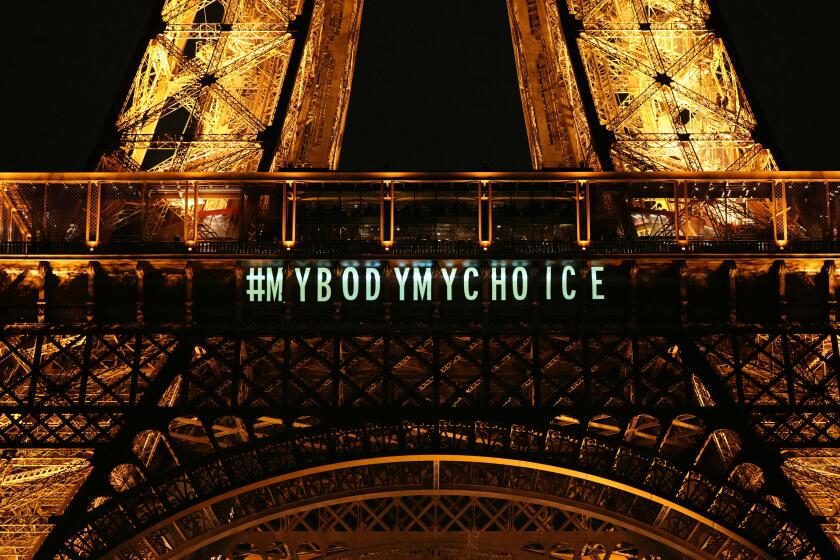Editorial: Pregnant women are not incubators. Antiabortion states should not deny them emergency care

- Share via
It’s absurd that in the 21st century, the Supreme Court is debating how close to death pregnant women need to be before doctors can perform a medically necessary abortion.
But that’s where we are nearly two years after this same court in the Dobbs decision overturned the constitutional right to an abortion — and launched a profusion of state abortion laws that range from repressive to downright dystopian. On Wednesday, the Supreme Court heard arguments in a case challenging a law in Idaho that falls into the latter category. It outlaws all abortions except in the case of rape and incest (and then, only in the first trimester of pregnancy) or when a patient is in danger of dying if they don’t have an abortion. Doctors who violate that could face up to five years in prison.
An Alabama court decision brought national attention to the creeping personhood movement that seeks to extend legal protection to fetuses and embryos.
But that death exception conflicts with the 1986 federal Emergency Medical Treatment and Labor Act — known as EMTALA. Under the law, emergency rooms in hospitals that receive Medicare funding (which most do) must treat and stabilize a person who has an urgent medical condition. A patient can be transferred elsewhere if medical resources are lacking at the hospital.
Abortion care in the ER wasn’t much of an issue before Dobbs. Now it is. The Biden administration argued in federal court that the portion of the Idaho ban that allows abortion only to stave off death is a violation of the law. EMTALA does not require that the serious medical condition be life-threatening. A federal court agreed and ruled that portion of the ban unenforceable. The Supreme Court put that lower court ruling on hold until it decides the case.
Zombie laws, in the hands of antiabortion zealots and the ultraconservative Supreme Court, are coming for more than abortion rights.
“Today, doctors in Idaho and the women in Idaho are in an impossible position,” said U.S. Solicitor Gen. Elizabeth Prelogar, arguing for the U.S. on Wednesday. “If a woman comes to an emergency room facing a grave threat to her health, but she isn’t yet facing death, doctors either have to delay treatment and allow her condition to materially deteriorate, or they’re airlifting her out of the state so she can get the emergency care that she needs.”
Fortunately, both liberal and conservative justices seem skeptical of the argument by Joshua Turner, representing the state of Idaho, that the federal government was overreaching by telling Idaho doctors how to practice medicine instead of letting them follow state medical licensing laws. “If ER doctors can perform whatever treatment they determine is appropriate, then doctors can ignore not only state abortion laws but also state regulations on opioid use and informed consent requirements,” he said.
Fearing that a future government could do what the U.S. Supreme Court did — reverse the right to abortion — France champions women’s rights.
That’s ludicrous, but this whole issue is ludicrous. Turner seemed to suggest that even under the abortion ban, doctors could decide to perform abortions in cases where pregnant women weren’t quite at death’s door but were, well, close enough.
But how close is close? Is a ruptured amniotic sac, which could lead to infection, sepsis and a possible hysterectomy, enough of a reason to do an abortion? Or do doctors have to wait until the person is hemorrhaging uncontrollably?
Turner’s argument that doctors use their judgment to determine that on a case-by-case basis isn’t reassuring. As Justice Sonia Sotomayor noted, that puts doctors in an unfair bind. For example, “your doctor says, I can’t, with a medical certainty, say she’s going to die, but I do know she’s going to bleed to death if we don’t have an abortion, but she’s not bleeding yet, so I’m not sure.”
There is now an alarmingly large swath of the country living with laws crafted with the patriarchal view that pregnant women are little more than vessels for what abortion opponents oxymoronically refer to as “unborn children.”
Idaho’s restrictive abortion ban has done enough damage by upending reproductive healthcare across the state, but it should not be allowed to withhold abortion care from people whose lives will be gravely harmed without it. We hope that the Supreme Court agrees that all Americans, pregnant or not, should have equal access to what Prelogar called the “simple but profound” promise of EMTALA — the stabilizing emergency medical care they need.
More to Read
A cure for the common opinion
Get thought-provoking perspectives with our weekly newsletter.
You may occasionally receive promotional content from the Los Angeles Times.













